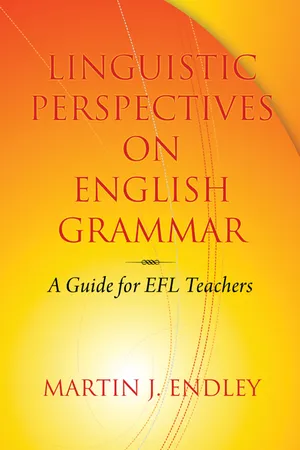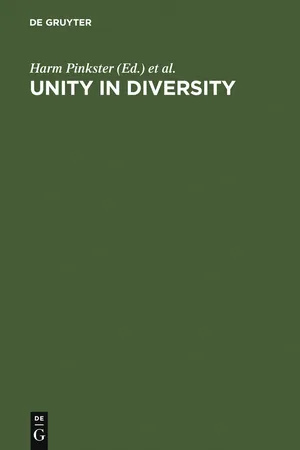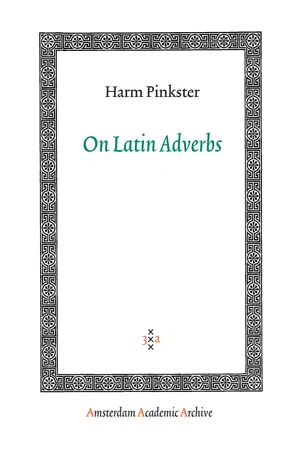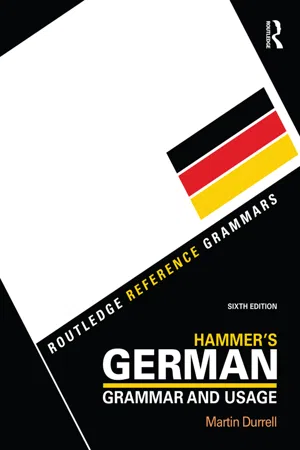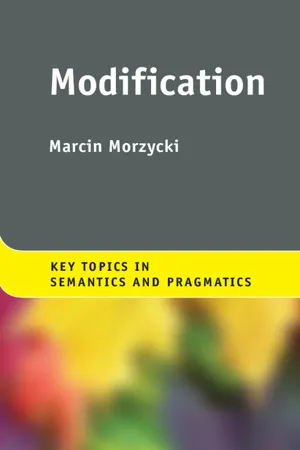Languages & Linguistics
Adverb
An adverb is a word that modifies or describes a verb, adjective, or another adverb. It provides information about the manner, time, place, frequency, degree, or certainty of an action or state. Adverbs often end in "-ly," but there are also irregular adverbs that do not follow this pattern.
Written by Perlego with AI-assistance
Related key terms
1 of 5
5 Key excerpts on "Adverb"
- eBook - PDF
- Martin J. Endley(Author)
- 2007(Publication Date)
- Information Age Publishing(Publisher)
Linguistic Perspectives on English Grammar, pages 77–111 Copyright © 2010 by Information Age Publishing All rights of reproduction in any form reserved. 77 3 Adjectives and Adverbs in Linguistic Perspective T he previous two chapters have focused on nouns and verbs, respectively. Nouns and verbs are the most fundamental syntactic categories in English, as indeed they are in all languages. There is a very good reason for this, since between them they enable many of the most basic and central func- tions that speakers require language for. Nouns allow us to talk about the relatively “time-stable” aspects of our experience, many of them being con- crete entities such as people and animals, trees and mountains, tables and chairs; others being more abstract aspects such as love, justice, democracy, and so on. Verbs, on the other hand, allow us to describe “time-unstable” situations—in particular, actions and states, which involve those nouns in one way or another. Yet speakers often want to do rather more than simply refer to “things” and “actions.” We want to add color to our speech, add- ing finer gradations of meaning than can be provided by nouns and verbs alone. In this chapter, I will be concerned with two other syntactic catego- ries that enable us to do exactly this, namely adjectives and Adverbs. 78 Linguistic Perspectives on English Grammar When viewed from a linguistic perspective, adjectives and Adverbs raise a number of interesting issues. As you will shortly see, these two word classes share certain general features in common, and some linguists have even suggested that they should be treated as subtypes of one overarching cat- egory since they perform a broadly similar role in the language. By way of illustration, look at the following passage taken from a work of fiction plucked at random from my bookshelves. None of the adjectives or Adverbs that the author employs is grammatically required. - eBook - PDF
Unity in Diversity
Papers Presented to Simon C. Dik on his 50th Birthday
- Harm Pinkster, Inge Genee, Harm Pinkster, Inge Genee(Authors)
- 2011(Publication Date)
- De Gruyter Mouton(Publisher)
1. Definition of Adverbs Most of the grammars mentioned list time words and locatives (sometimes referred to by other terms) as separate categories apart from Adverbs and/or particles. Adverbs (and particles) are described as free uninflected forms that modify the predicate or clause. (Note: Since I am referring to a number of descriptions, it would be rather cumbersome to quote the definitions verbatim, because various kinds of terminology have been used.) 1.1. Temporal Adverbs It would seem that at least in some languages time words may be considered as Adverbs. Take Kobon rol 'tomorrow/yesterday' as in (1). Adverbs in Papuan languages 213 (1) Kobon: Rol yad aip Jepi aip abö g-öl yesterday I with J. with draw bow-SIM mid-ai-lo ribö giyan de-DUR-RPID river below 'Yesterday Jepi and I were lying in wait down at the river' Rol is listed as a general time expression, together with, among others, haino 'later, after', porpor 'always' (Davies 1981: 140). These latter two words figure as Adverbs on p.49. In (2) rol conforms to Davies' stipulation that simple Adverbs must immediately precede the predicate. (2) Kobon: Yad rol ar-nab-in Is tomorrow go-fut-ls Ί will go tomorrow' Combining these bits of information I would suggest that temporal Adverbs in Kobon express temporal satellites and that they are relatively free as regards their position. This characterization is not unlike the behaviour of the Usan temporal Adverb barim 'one day removed' (i.e. *yesterday' or 'tomorrow') in (3). - No longer available |Learn more
- Harm Pinkster(Author)
- 2005(Publication Date)
- Amsterdam University Press(Publisher)
4. THE Adverb IN LATIN LINGUISTICS If one comRares the definition of the Adverb given by Priscian and other Roman grammarians (viz.: the Adverb is an invariable word, the meaning of which is added to that of the verb just as the meaning of the adjective is added to that of the noun) with the usual definition in modern Latin grammars -as well as with grammars of modern languages -the main difference turns out to be that nowadays Adverbs are said to modify adjectives and other Adverbs as well 1 • Most words which are now called Adverbs were considered Adverbs by Roman grammarians. The overall impression is still one of heterogeneity (L6fstedt 1967: 79; Marouzeau 1949: 11; Booth 1923: IX). The adapted definition is not sufficient to cover the characteristics of these words. I will examine what modern grammarians have to say about the Adverb as far as morphology and phonology, semantics and syntax are concerned. On morphology, I will remark that the classification needs no revision. What is problematic is only the meaning of the term 'invariable'. This term will be discussed in ch. 5. The semantic subclassification, which is in fact the only subclassification given, will appear to be rather unsatisfactory, especially with respect to so-called manner Adverbs. The syntactic remarks, finally, if 1 I have tried to find out who was the first to make this addition to the ancient definition. The earliest criticism I encountered was by Julius Caesar Scaliger in his De causis linguae latinae, ch. 158: 'Therefore not only is the term 'Adverb' a bad construction of the ancient grammarians, but also the definition they gave is unwise, for it is not only a modifier of the verb, but also of the nomen' (that is adjective and, perhaps, substantive). - eBook - PDF
- Martin Durrell(Author)
- 2016(Publication Date)
- Routledge(Publisher)
7 Adverbs The traditional term Adverb covers a range of words with a variety of uses. Typically, Adverbs are words which do not decline and which express relations like time , place and manner . They can be used: • to qualify verbs: Sie hat ihm höflich geantwortet • to qualify adjectives: ein natürlich eleganter Stil • in relation to the sentence as a whole, e.g. Er hat ihr sicher geholfen There is considerable disagreement about which words should be considered as Adverbs in German and how they are best classified. In this chapter we use a simplified classification for practical purposes, and this is summarized in Table 7.1 . TABLE 7.1 Main types of Adverb Adverbs Use Examples time place direction attitude/viewpoint reason/cause manner degree interrogative answering the question when answering the question where answering the question where to/from commenting on what is said, or answering a yes/no question answering the question why answering the question how answering the question how much/ small (often with adjectives) used to ask questions damals, lange, oft, gestern, heute hier, dort, oben, draußen, überall dahin, daher, hinüber, herein hoffentlich, leider, wahrscheinlich, natürlich, psychologisch dadurch, daher, deshalb, folglich, trotzdem irgendwie, anders, telefonisch sehr, außerordentlich, relativ, etwas, ziemlich wann?, weshalb?, wieso? Phrases, often with a preposition, can have the same function as an Adverb in a sentence. Compare: Sie hat heute gearbeitet – Sie hat den ganzen Tag gearbeitet Sie ist trotzdem gekommen – Sie ist trotz des Regens gekommen Sie blieb dort – Sie blieb in der alten Stadt am Rhein The term AdverbIAL is used to refer both to single words and to phrases like the above (traditionally called Adverbial phrases ) which have the same function in a sentence. - eBook - PDF
- Marcin Morzycki(Author)
- 2015(Publication Date)
- Cambridge University Press(Publisher)
More generally, I will observe a distinction between ‘Adverb’, the name of a syntactic category, and ‘Adverbial’, the collective term for phrases headed by Adverbs and for phrasal modifiers of verbal projections and clauses. Part of the focus on Adverbs in the more restricted sense is practical. Discussing Adverbials as a class would entail discussing virtually all of formal semantics. There’s hardly any area of the field that hasn’t been 193 194 Adverbs concerned to a large extent with some class of Adverbials in one way or another, and in certain areas – such as temporal semantics – the analysis of Adverbials constitutes much of the enterprise. Unavoidably, though, I’ll briefly touch on some Adverbials whose serious examina- tion is best undertaken by looking elsewhere (say, a book on temporal semantics). Many issues that fall under the broad rubric of ‘Adverbials’ will also be taken up in Chapter 6 as instances of crosscategorial phe- nomena. As for this chapter, section 5.2 considers how some taxonomical orga- nization can be imposed on the chaos of Adverbs. Section 5.3 then takes the first steps toward an analysis, wrestling with basic compositional questions. Section 5.4 examines two classes of Adverbs (manner and subject-oriented) in more detail. Section 5.5 turns to Adverbs that occur higher in the clause. Section 5.6 introduces some facts and tools rele- vant to locative Adverbials. Section 5.7 turns to the ill-understood phe- nomenon of Adverbs as modifiers of adjectival projections. Section 5.8 mostly just sets aside temporal and quantificational Adverbials. Section 5.9 concludes by revisiting the question of the relative order of Adverbs. 5.2 CLASSIFYING AdverbIALS One of the odder properties of Adverbs is that their interpretation seems to change radically with their syntactic position.
Index pages curate the most relevant extracts from our library of academic textbooks. They’ve been created using an in-house natural language model (NLM), each adding context and meaning to key research topics.
